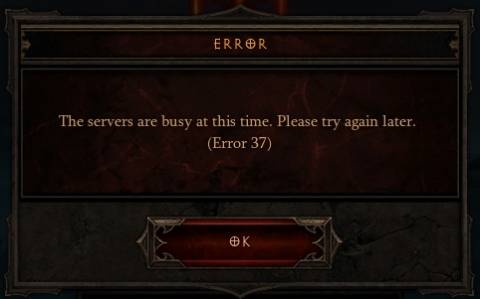SimCity has been out for, as of this piece's publishing, five days. For those five days, players have been unable to play SimCity, save but for brief, taunting periods of functionality. The online servers remain clogged and/or offline, which is a problem given the game's insistence that players be online in order to play at all. Maxis has come out and apologized directly for all of this, while making claims to improved, but still problematic server functionality, and proffering a token of peace in the form of a free (as-yet-undetermined) EA game. But while those reports of improvement are great to hear, people still can't play across the board, and even working servers are still running into issues, despite the shut-off of some in-game services. As it stands, a game that people paid $60 for barely functions, if at all, and people are understandably upset.

SimCity has other problems with its design, many of which I laid out in my review, but the talk of the past week has been the servers, as well as the reviews that have or have not appeared in the wake of the game's shoddy launch. It's not hard to understand why. For whatever design flaws SimCity might have, the simple fact of the matter is that people, including many reviewers who chose to wait until post-launch to test the game, cannot play it. And those that did choose to review it prior to launch are suddenly catching no small amount of shit from the SimCity community for not taking the game's server performance into account prior to reviewing.
In all my years critiquing games, this is maybe the weirdest launch week I've ever found myself a part of. I've written and edited my way through numerous MMO launches, online multiplayer games, and, of course, last year's similar debacle involving the always-online Diablo III. When that game came around, I remember there was some trepidation regarding Blizzard's ability to handle the surge of players come launch, especially given the rocky start of Blizzard's bread-and-butter, World of Warcraft, back in its first year. Still, while Diablo III still ran into server issues for some time following release, it did manage to iron out its most egregious connection wrinkles relatively quickly compared to SimCity, which EA is still, several days later, trying to salve with additional servers.
EA's line on all of this is that they didn't expect the volume of players they received, nor did they expect them to play for the long stretches they've apparently been playing (provided they're actually able to get into the game in the first place). As someone who has gone through several sometimes rocky website launches (including one fairly recent one some of you may recall), it's not that I don't have some sympathy for the developers who are forced to try and fix this while everyone is shouting at them from every angle. You can't test for everything, and weird things will always pop up in the live environment that you can't account for. That said, I would echo the sentiment others have expressed that EA's insistence on hour-limited gaming sessions during SimCity's beta probably didn't do them any favors.
Regardless of what went wrong, the fact of the matter is that we're here, now, with a fairly broken game that has nonetheless garnered relatively high reviews from those who were able to play it, as well as fairly negative ones from those who have run into various problems trying to play it. Out of that strange dichotomy of reviews has evolved a salient pair of questions. Namely, if games are as much about their services as they are the core gameplay--as Joystiq's Alexander Sliwinski smartly poses in his editorial on the subject--should we be reviewing them before they launch? And should the scores be adjusted to reflect the ever-evolving state of such games?
Let's tackle that first part. When I started at GameSpot back in 2003, even then we had a policy that more or less dictated that all online games should be tested in an environment that satisfactorily emulates the retail experience. Early in my tenure, that policy made a lot of sense, as online multiplayer games often had a tendency to feature server problems, bugs, and whatever else that you might not see just playing against other journalists on pre-release servers. In recent years, this has become somewhat less necessary, as live servers have gone up earlier and earlier prior to games' launches, and retail copies have become more readily available to press prior to release. However, for a game like, say, an MMO, nobody in their right mind would review it without spending ample time on retail servers. Granted, that's usually because with games like that, you literally can't play it until it's live for everybody. But in the rare case that you would be granted some kind of early access, it still wouldn't matter, since so much of the game's content pertains to the online experience.
SimCity operates in a weird middle-ground between those two examples. In SimCity, you can absolutely see the content of the game even if only a few players are around and servers are up. EA provided multiple critics (including myself) early codes that ran on servers specifically set up by the devs for review processes. It was made abundantly clear in the various communiques between press and PR that these would not necessarily be indicative of the live experience, but that we could use these to get started. That was exactly the attitude I took when taking to the game last weekend. I wanted to see everything I could, as I was under the impression that some kind of server catastrophe could happen. Though I wouldn't say I expected anything quite like this.
Ask most industry prognosticators whether or not they saw the disastrous launch of EA's online-always SimCity coming, and they'll nearly universally answer yes. That might sound odd, considering there weren't alarm bells being sounded on a regular basis prior to the game's launch. If you go back and read most pre-release coverage of SimCity, you might see various writers making mention of the game's always-connected infrastructure, perhaps even noting some reservations with the idea. But doom and gloom was really nowhere of any obviousness to be found. I think there is perhaps a reasonable reluctance among those in our trade to appear too negative without having solid experiences to back that up. At the same time, most of us are dyed-in-the-wool cynics, so when someone says to us, "Yeah, we're gonna be online all the time," our reaction is usually to just smile, nod, and hope for the best, even though deep down, we have an inkling that this is all going to go horribly wrong.

Unfortunately, the negative reaction from players was probably exacerbated by the early salvo of mostly positive reviews from critics that hit prior to launch day. Perhaps most notable among them was Polygon's effusively positive review. Russ Pitts very much adored the game, and reviewed it accordingly, awarding it a 9.5. But he also did so prior to launch, a fact that people have complained about given the apocalyptic server situation. But then Polygon did something interesting; it changed its score. From a 9.5, the game tumbled downward to an 8. Then, as the server issues continued and game services were cut in the hopes of salvaging some server availability, the score dropped to a 4.
Understand, this is all completely in keeping with Polygon's oft-stated editorial policy. At the outset of that site's launch, its editors spent ample time explaining how they planned to review games. In dictating that policy, Polygon made it clear that it believes as games continue to grow and evolve, so too must the review process. Games of the modern era are not static, in that service issues, DLC updates, and patches can all radically change how a product performs. The goal with this system was to allow editors to "bump" (their parlance, not mine) scores depending on how these factors come into play post-review. Each of the updates to SimCity's review have come with detailed explanations from Pitts laying out why these changes have come to pass.
This has been a source of much controversy among those who follow game reviews. Granted, that's probably a fairly small demographic overall, but as someone who has something of an investment in how video game criticism evolves over time, I've been nothing short of fascinated by it all.
The thing is, adding a degree of flexibility in reviewing isn't new. This is something Jeff, myself, and countless others have talked about at various points over the years. In fact, GameSpot has been providing updates to its reviews for a while now, taking into account DLC and patch updates where necessary. Kotaku also does a version of this, with its "Yes/No/Not Yet" scale, which updates depending on how issues with games are corrected over time. My point is, this is a conversation that's been happening in various forms for quite a long time, and it's still something many of us think about with great frequency. Especially Jeff, who maybe spends more time thinking about review policies than is really healthy.
I won't speak for what Giant Bomb's editorial policies could be in the future, since any changes would have to be discussed by us as a team, and decided at higher levels than my own. I will say that for my own purposes, I don't think I'll ever feel the desire or personal need to change my SimCity score. Granted, my approach to reviewing SimCity may have been different than others. I looked at the server issues as one complaint among several, and decided that based on its troubled launch, not to mention the problematic philosophy behind the always-online model, it would be worth dinging the game for these problems. I also made mention that those problems could just as easily go away within a few days. So far, they haven't, but that's not really even the point.
The point is, I'm done with SimCity. I spent many hours playing it in various states of functionality, and by the time I had seen everything I needed to see, I had a set of points I intended to make. Once those were made, and a score was settled on, I stopped trying to play SimCity, resolving myself not to touch it again until the servers completely cleared themselves up. And even if/when they do, I won't be changing the review. Considering that we have no shortage of ways to cover post-release content, through various forms of video, news, and podcast coverage, the idea of having to go back and change a review after some post-release fixes strikes me as overkill.
At a point, it feels like we're coddling these products. I am constantly appreciative of that fluid nature of games, the one that lets improvements and changes find their way into the products long after release, but I'm also of the belief that a game's launch should be indicative of a developer's best effort. When you first put a game on store shelves, you should be putting your absolute best foot forward. That game should be as close to the vision you have for a functioning, entertaining product as you can possibly get, because otherwise, why are you charging people for it? Nobody wants to play an unfinished game, and the increasingly lax attitude from developers and publishers in recent years, one of "put it out and we'll fix it later," is one I just haven't ever been able to get behind. If we're just running back to update these scores every time a developer makes a significant bug fix post-launch, at what point do we draw the line between keeping our audience informed, and bending over backward to accommodate games that launched busted in the first place?

But that's just my argument against the idea. I'm not eternally declaring against adjustable reviews, but in this conversation we're having, my feeling is that I don't necessarily want or need this kind of flexibility when I'm reviewing a game, because I don't need it from the reviews I read. Of course, my personal disagreement does not make idea behind actively adjusting scores an ignoble one. Polygon isn't doing this because it just wants to be different, I don't think, but rather because it just wants to make sure its readers are able to make the most informed decision possible at any given moment. I expect that's why they opted to review the game prior to launch, as well. In this case, they might have been better served waiting, since it would have negated some of the need for score changing, but when your system is already built to allow for such a thing, there's perhaps little reason to worry about it.
I also wonder if Polygon would even be getting this kind of guff from people if they didn't use scores to begin with. But that's another, longer topic of conversation, one I'm already exhausted with just thinking about it. So it is perhaps enough to say that while I don't necessarily agree with everything Polygon's done in handling its SimCity review, I absolutely support their right to review games how they see fit for their audience. Just because I believe my scores and reviews should remain static doesn't make me believe that everyone should just feel the same way. What works for me doesn't work for everybody. While I believe that the time-tested method of reviewing a game and letting that stick is still completely reasonable for most, I'd like to think that experimentation with said methods should not only be allowed, but encouraged. Everyone is different, after all, and one editorial voice and direction certainly won't suit every consumer.
Talking about these kinds of editorial standards is never a bad thing, and while it's unfortunate that it took SimCity's launch being mucked up so spectacularly for it to happen, I'm just glad we're having these conversations. Not even a few hours after Sliwinski posted his editorial, he and I were chatting it up about editorial policies and flexible review standards and all that fun stuff. These are great conversations to have. People are saying thoughtful, interesting things about the nature of game criticism and how it evolves with the technology, and I love that. After all, if we don't talk about it, then nothing changes. And if there's one thing SimCity has taught me over the years I've spent playing its various incarnations, it's that stagnation is maybe the only thing worse than failure.
--
Just as an FYI, I'm on vacation all this week, and as such, our own Jeff Gerstmann will be handling Sunday column duties next Sunday. See you all in a while!
--A